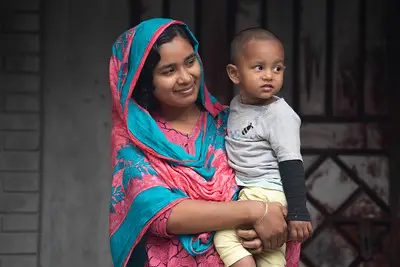RTI-implemented project will partner with local groups to comprehensively strengthen health systems
RESEARCH TRIANGLE INSTITUTE, N.C. – Over the last 50 years, Bangladesh has seen significant improvements across key health metrics, including maternal and child mortality, fertility rate and nutritional status. At the same time, maternal mortality has stagnated, child stunting continues to be a challenge, needs for family planning remain unmet, and it is one of eight countries that account for more than two-thirds of the global tuberculosis (TB) burden, a curable disease that kills 115 people across the country every day. To address this challenge and others, the U.S. Agency for International Development (USAID) has selected RTI International, a nonprofit research institute and leading international development organization, to implement its Strengthening Local Level Health Systems (SLLHS) project.
“Bangladesh has made great progress in reducing preventable deaths over the last two decades,” said Afsana Karim, RTI’s deputy chief of party for the project. “However, more work needs to be done to address the gaps in access to quality health care. We are excited to work with the Government of Bangladesh (GOB) to address health system challenges.”
SLLHS will serve as a catalyst to deliver measurable and equitable improvements in maternal and child health, family planning, nutrition, TB, pandemic preparedness and infectious diseases.
Through SLLHS, RTI will address gaps and needs across the health systems building blocks (governance, finance, human resources, information, service delivery and commodities) to further strengthen health systems at the local level to help the GOB achieve its goal of Universal Health Coverage by 2030.
To achieve goals laid out by USAID, RTI will focus on the following key areas:
Data for decision-making: Enhance data capabilities for equitable healthcare access and service quality.
Cultivating local health leaders: Implement effective leadership and coordination methods for improved services.
Making systems improvements at scale: Leverage global best practices such as smart purchasing, enhanced funding access, digital tools and peer-to-peer learning.
Bangladesh’s vulnerability to climate change and the compounding risk of novel and reemerging infections (dengue, cholera) endanger progress. While consensus on climate and pandemic risk has grown, local level health authorities do not have the data analysis tools and skills for forward-looking risk-based planning. Leveraging RTI’s experience building local climate modeling dashboards, SLLHS will transfer the capacity to predict and plan according to tailored risk assessments. SLLHS will help authorities use data to identify and prioritize localized climate risks from stressors (heat, drought, food insecurity), shocks (floods, other disasters), and increases in climate-sensitive diseases.
“We are thrilled and honored to combine RTI’s health systems strengthening expertise with that of the Government of Bangladesh, our partners and local health system actors,” said Cristina Bisson, RTI’s vice president for global health. “Functional health systems are the key to high-quality, equitable health services that can improve maternal and child health, treat diseases and ensure a well-equipped health workforce, both now and into the future.”
RTI will work with four in-country partners to implement the project: the International Centre for Diarrhoeal Disease Research, Bangladesh (icddr,b); BRAC; the University of Dhaka’s Institute of Health Economics; and Research, Training, and Management International.
Learn more about RTI’s work in global health
Learn more about RTI’s experience strengthening local level health systems

Photo Credit: RTI International/Abir Abdullah
To request an interview, contact our Media Relations team.
